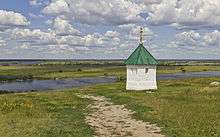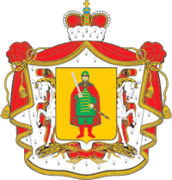Ryazan Oblast
| Ryazan Oblast Рязанская область (Russian) | |||
|---|---|---|---|
| — Oblast — | |||
| |||
|
| |||
| |||
|
| |||
| Political status | |||
| Country | Russia | ||
| Federal district | Central[2] | ||
| Economic region | Central[3] | ||
| Established | September 26, 1937[4] | ||
| Administrative center | Ryazan[5] | ||
| Government (as of February 2015) | |||
| • Governor[6] | Oleg Kovalyov[7] | ||
| • Legislature | Oblast Duma[6] | ||
| Statistics | |||
| Area (as of the 2002 Census)[8] | |||
| • Total | 39,600 km2 (15,300 sq mi) | ||
| Area rank | 58th | ||
| Population (2010 Census)[9] | |||
| • Total | 1,154,114 | ||
| • Rank | 45th | ||
| • Density[10] | 29.14/km2 (75.5/sq mi) | ||
| • Urban | 70.9% | ||
| • Rural | 29.1% | ||
| Population (January 2015 est.) | |||
| • Total | 1,135,916[11] | ||
| Time zone(s) | MSK (UTC+03:00)[12] | ||
| ISO 3166-2 | RU-RYA | ||
| License plates | 62 | ||
| Official languages | Russian[13] | ||
| Official website | |||
Ryazan Oblast (Russian: Ряза́нская о́бласть, tr. Ryazanskaya oblast; IPA: [rʲɪˈzanskəjə ˈobləsʲtʲ]) is a federal subject of Russia (an oblast). Its administrative center is the city of Ryazan, which is the oblast's largest city. Population: 1,154,114 (2010 Census).[9]
Geography
Ryazan Oblast borders Vladimir Oblast (N), Nizhny Novgorod Oblast (NE), the Republic of Mordovia (E), Penza Oblast (SE), Tambov Oblast (S), Lipetsk Oblast (SW), Tula Oblast (W), and Moscow Oblast (NW).
In terms of physical geography, Ryazan Oblast lies in the central part of the Russian Plain between the Central Russian and Volga uplands. The terrain is flat, with a highest point of no more than 300 m above sea level. Soils are podzolic and boggy on the left bank of the Oka, changing southward to more fertile podzolic and leached black-earths (chernozyom).
Hydrography

Most of the Ryazan Oblast lies within the Volga basin, with the Oka the principal river of the area.
History
Human occupation of the area of the Ryazan Oblast dates from at least the Upper Paleolithic period. Volga Finnic tribes occupied the region prior to assimilation and expulsion by the East Slavs, a process virtually completed by the 13th century CE.
The Ryazan area became part of the Kievan Rus' political system, and came under the domination of the Principality of Chernigov (founded in 988). The Principality of Ryazan operated as a separate entity from 1097 to 1521, when the area became part of the Grand Duchy of Moscow, though with the Qasim Khanate district retaining some autonomy until the 1550s.
The Ryazan Governorate became separate from the Moscow Governorate in 1796. The present-day Ryazan Oblast, formed out of the Moscow and Voronezh oblasts, dates from 1937.
Administrative divisions
Economy
Ryazan Oblast is a part of the Central economic region. The oblast is in an economically favorable geographical location owing to the water and land routes that pass through it and provide stable domestic and foreign economic ties. It is considered both an industrial and agrarian Oblast. The foundations of agriculture in the oblast are livestock farming and plant cultivation. Livestock farming specializes in raising and fattening cattle and breeding pigs, sheep, and poultry. Beekeeping is also well developed in the oblast.
Transportation
- Solotchinskoye peat narrow gauge railway is located in Ryazansky District
- Mesherskoye peat narrow gauge railway is located in Klepikovsky District
Demographics
Population: 1,154,114 (2010 Census);[9] 1,227,910 (2002 Census);[14] 1,345,924 (1989 Census).[15]
- 2012
- Births: 12 351 (10.8 per 1000)
- Deaths: 18 723 (16.3 per 1000) [16]
- Total fertility rate:[17]
- 2009 - 1.42 | 2010 - 1.44 | 2011 - 1.45 | 2012 - 1.54 | 2013 - 1.55 | 2014 - 1.60 | 2015 - 1.65(e)
Ethnic composition (2010):[9]
- Russians - 95.1%
- Ukrainians - 0.8%
- Armenians - 0.5%
- Mordvins - 0.5%
- Tatars - 0.5%
- Azeris - 0.4%
- Uzbeks - 0.3%
- Others - 1.9%
- 74,419 people were registered from administrative databases, and could not declare an ethnicity. It is estimated that the proportion of ethnicities in this group is the same as that of the declared group.[18]
Religion
According to a 2012 official survey[19] 63% of the population of Ryazan Oblast adheres to the Russian Orthodox Church, 3% are unaffiliated generic Christians, 1% are Orthodox Christian believers without belonging to church or belonging to non-Russian Orthodox churches, 1% are Muslims, and 1% are adherents of the Rodnovery (Slavic native faith) movement. In addition, 15% of the population declares to be "spiritual but not religious", 9% is atheist, and 7% follows other religions or did not give an answer to the question.[19]
See also
References
| Wikimedia Commons has media related to Ryazan Oblast. |
Notes
- ↑ Article 7 of the Charter of Ryazan Oblast states that the oblast may have an anthem, providing a law is adopted to that effect. As of 2015, no such law is in place. The Symbols section on the Ryazan Oblast's official website also does not include an anthem.
- ↑ Президент Российской Федерации. Указ №849 от 13 мая 2000 г. «О полномочном представителе Президента Российской Федерации в федеральном округе». Вступил в силу 13 мая 2000 г. Опубликован: "Собрание законодательства РФ", №20, ст. 2112, 15 мая 2000 г. (President of the Russian Federation. Decree #849 of May 13, 2000 On the Plenipotentiary Representative of the President of the Russian Federation in a Federal District. Effective as of May 13, 2000.).
- ↑ Госстандарт Российской Федерации. №ОК 024-95 27 декабря 1995 г. «Общероссийский классификатор экономических регионов. 2. Экономические районы», в ред. Изменения №5/2001 ОКЭР. (Gosstandart of the Russian Federation. #OK 024-95 December 27, 1995 Russian Classification of Economic Regions. 2. Economic Regions, as amended by the Amendment #5/2001 OKER. ).
- ↑ Resolution of September 26, 1937
- ↑ Charter of Ryazan Oblast, Article 9
- 1 2 Charter of Ryazan Oblast, Article 27
- ↑ Official website of Ryazan Oblast. Oleg Ivanovich Kovalyov, Governor of Ryazan Oblast (Russian)
- ↑ Федеральная служба государственной статистики (Federal State Statistics Service) (2004-05-21). "Территория, число районов, населённых пунктов и сельских администраций по субъектам Российской Федерации (Territory, Number of Districts, Inhabited Localities, and Rural Administration by Federal Subjects of the Russian Federation)". Всероссийская перепись населения 2002 года (All-Russia Population Census of 2002) (in Russian). Federal State Statistics Service. Retrieved 2011-11-01.
- 1 2 3 4 Russian Federal State Statistics Service (2011). "Всероссийская перепись населения 2010 года. Том 1" [2010 All-Russian Population Census, vol. 1]. Всероссийская перепись населения 2010 года (2010 All-Russia Population Census) (in Russian). Federal State Statistics Service. Retrieved June 29, 2012.
- ↑ The density value was calculated by dividing the population reported by the 2010 Census by the area shown in the "Area" field. Please note that this value may not be accurate as the area specified in the infobox is not necessarily reported for the same year as the population.
- ↑ Ryazan Oblast Territorial Branch of the Federal State Statistics Service. Предварительная оценка численности населения на 1 января 2015 г. и в среднем за 2014 год (Russian)
- ↑ Правительство Российской Федерации. Федеральный закон №107-ФЗ от 3 июня 2011 г. «Об исчислении времени», в ред. Федерального закона №271-ФЗ от 03 июля 2016 г. «О внесении изменений в Федеральный закон "Об исчислении времени"». Вступил в силу по истечении шестидесяти дней после дня официального опубликования (6 августа 2011 г.). Опубликован: "Российская газета", №120, 6 июня 2011 г. (Government of the Russian Federation. Federal Law #107-FZ of June 31, 2011 On Calculating Time, as amended by the Federal Law #271-FZ of July 03, 2016 On Amending Federal Law "On Calculating Time". Effective as of after sixty days following the day of the official publication.).
- ↑ Official on the whole territory of Russia according to Article 68.1 of the Constitution of Russia.
- ↑ Russian Federal State Statistics Service (May 21, 2004). "Численность населения России, субъектов Российской Федерации в составе федеральных округов, районов, городских поселений, сельских населённых пунктов – районных центров и сельских населённых пунктов с населением 3 тысячи и более человек" [Population of Russia, Its Federal Districts, Federal Subjects, Districts, Urban Localities, Rural Localities—Administrative Centers, and Rural Localities with Population of Over 3,000] (XLS). Всероссийская перепись населения 2002 года [All-Russia Population Census of 2002] (in Russian). Retrieved August 9, 2014.
- ↑ Demoscope Weekly (1989). "Всесоюзная перепись населения 1989 г. Численность наличного населения союзных и автономных республик, автономных областей и округов, краёв, областей, районов, городских поселений и сёл-райцентров" [All Union Population Census of 1989: Present Population of Union and Autonomous Republics, Autonomous Oblasts and Okrugs, Krais, Oblasts, Districts, Urban Settlements, and Villages Serving as District Administrative Centers]. Всесоюзная перепись населения 1989 года [All-Union Population Census of 1989] (in Russian). Институт демографии Национального исследовательского университета: Высшая школа экономики [Institute of Demography at the National Research University: Higher School of Economics]. Retrieved August 9, 2014.
- ↑ http://www.gks.ru/free_doc/2012/demo/edn12-12.htm
- ↑ http://www.gks.ru/wps/wcm/connect/rosstat_main/rosstat/ru/statistics/publications/catalog/doc_1137674209312
- ↑ http://www.perepis-2010.ru/news/detail.php?ID=6936
- 1 2 3 Arena - Atlas of Religions and Nationalities in Russia. Sreda.org
- ↑ 2012 Survey Maps. "Ogonek", № 34 (5243), August 27, 2012. Retrieved September 24, 2012.
Sources
- Рязанская областная Дума. №115-ОЗ 18 ноября 2005 г. «Устав (Основной Закон) Рязанской области», в ред. Закона №102-ОЗ от 28 декабря 2015 г. «О внесении изменений в Устав (Основной Закон) Рязанской области». Вступил в силу со дня официального опубликования (22 ноября 2005 г.). Опубликован: "Рязанские ведомости", №251–252, 22 ноября 2005 г. (Ryazan Oblast Duma. #115-OZ November 18, 2005 Charter (Basic Law) of Ryazan Oblast, as amended by the Law #102-OZ of December 28, 2015 On Amending the Charter (Basic Law) of Ryazan Oblast. Effective as of the day of official publication (November 22, 2005).).
- Центральный исполнительный комитет СССР. Постановление от 26 сентября 1937 г. «О разделении Московской области на Тульскую, Рязанскую и Московскую области». (Central Executive Committee of the USSR. Resolution of September 26, 1937 On Splitting Moscow Oblast into Tula, Ryazan, and Moscow Oblasts. ).
 |
|
|
|
 |
| |
|
| ||
| ||||
| | ||||
| |
|
|




